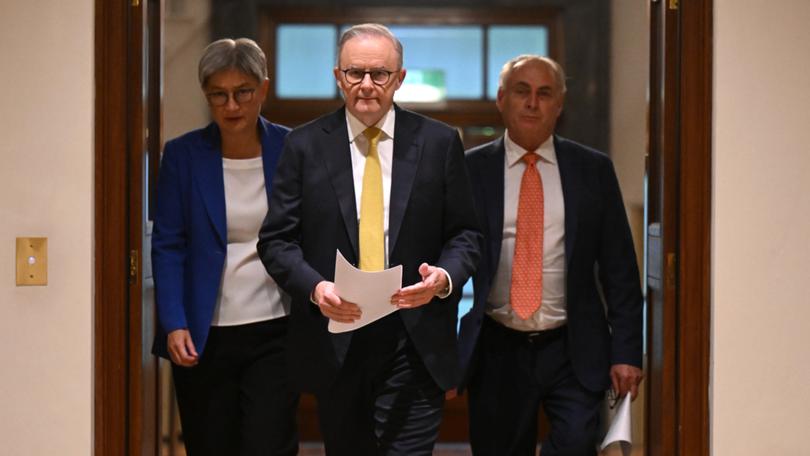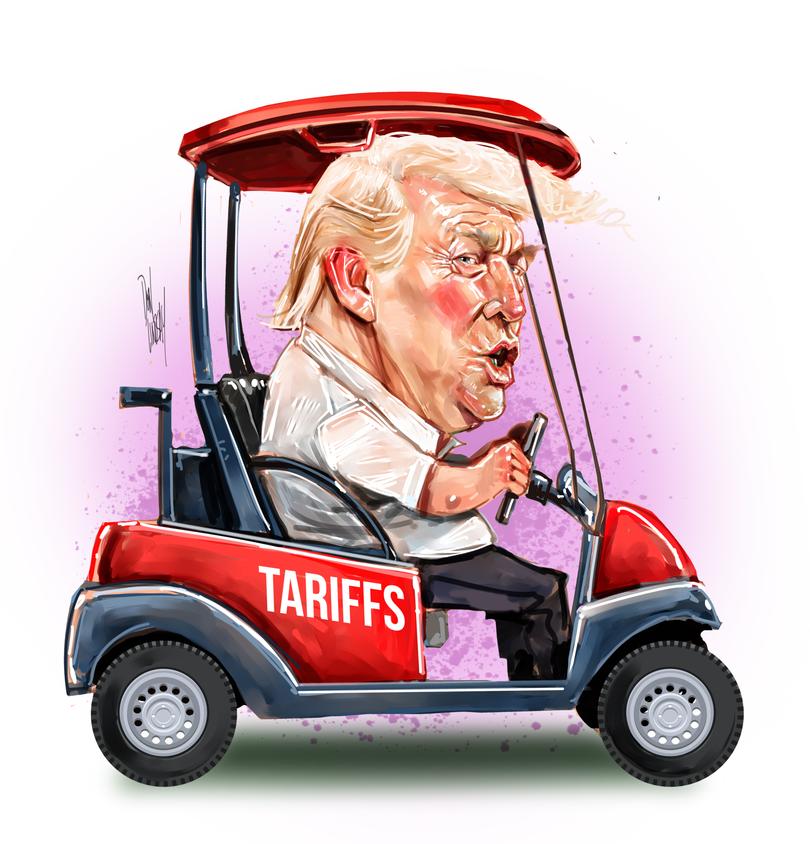MARK RILEY: Donald Trump’s trade war will have a profound impact on the Federal election
MARK RILEY: Whoever wins this election will have to go to Washington as soon as possible to eyeball the President and argue Australia’s case.

It was with something greater than mild understatement that Donald Trump declared from the White House Rose Garden this week that: “I think you’re going to remember today.”
He was right.
How could the world forget what he was doing?
Sign up to The Nightly's newsletters.
Get the first look at the digital newspaper, curated daily stories and breaking headlines delivered to your inbox.
By continuing you agree to our Terms and Privacy Policy.Or forgive.
And its response will give Americans something to think about.
Trump has declared it “Liberation Day”.
For the rest of the world it was “Recession Day”.
It was the day America upended its relationships with the international community.
A day in which Donald Trump imposed tariffs on Israel and Iran, Jordan and Japan, Albania and Australia.
A day in which the US President targeted “friends and foes” observing that “some of our friends are worse than our foes”.
Really. He actually said that.
And it was a day in which Donald Trump put the world’s entire geo-strategic landscape up for renegotiation.
The biggest loser in all of that is America.
The biggest potential winner is China.
By thumping regional partners like South Korea, Thailand, Vietnam and Japan with heavy tariffs, Trump is directing them into Beijing’s hands as those countries look to offset the damage of his decision by expanding their trade with other countries.
Anthony Albanese watched the extraordinary spectacle from his hotel suite in Melbourne, surrounded by his senior advisers.
He’d dined the previous night with Australian golfing great Greg Norman, who had helped former ambassador to the US Joe Hockey build a direct line to Trump and secure exemptions from his first round of what now appear in retrospect to have been mild trade restrictions.
While Trump threw other friendly nations into the bunkers and the drink, Australia found itself just off the green.
A 10 per cent tariff is the mildest of all those imposed.
And despite Trump’s particular beef with US beef being banned from Australia because it doesn’t comply with our biosecurity laws, government officials confirmed yesterday that our beef exports won’t be banned from the US.
They will be hit with the same 10 per cent tariff levied on all our exports.
Albanese argues that a truly “reciprocal” tariff on Australian goods would be zero, insisting we don’t apply any levy on US goods under our free trade agreement.
America’s claim that Australia imposes an “effective” tariff of 10 per cent on its products seems to be a reference to the GST.

Albanese said Trump’s decision to include Australia was unwarranted but not unexpected.
Our Ambassador to the US, Kevin Rudd, had informed him some time ago that Trump was threatening a minimum tariff of 20 per cent and that anything below that would be a victory.
Government officials say, only half-jokingly, that Rudd has not slept for a month in his characteristically unrelenting bid to negotiate a better deal with the White House.
Albanese says the tariffs are not the actions of a friend, again emphasising that the American people will pay the highest price.
But he says he will not engage in a race to the bottom by imposing reciprocal tariffs on US goods that would only hurt Australian consumers.
Trade Minister Don Farrell suggests, although not in so many words, that Australia will now attempt to negotiate its way out of these restrictions in the same way it did with China — sector by sector, product by product, company by company.
We have moved into some sort of parallel universe when the greatest threat to Australian prosperity isn’t President Xi but President Trump.
The impact on the Federal election campaign is profound.
Anthony Albanese approached it yesterday as an opportunity to showcase strength in leadership.
He mustered all the appropriate euphemisms for firing up unified, parochial, bordering-on-nationalistic fervour.
He insisted Australia would not concede its principles or buckle to US pressure, vowing to always act in Australia’s best interests.
Peter Dutton seized the opportunity to direct part of the blame at Albanese, branding his inability to get a third phone call with President Trump “a significant failure”.
His strategy will be to convince voters that he could have done a better job and will if he is elected.
Anthony Albanese says this is no time to be partisan.
But in an election campaign the temptation always is to be.
What is clear, though, is that whoever wins this election will have to go to Washington as soon as possible to eyeball the President and argue Australia’s case.
We have been close friends and allies for more than a century.
Our military, business, cultural, sporting and personal ties run a lot deeper than an afternoon of mercantilist pantomime in the Rose Garden.
That is something that Donald Trump should remember.
Today and every day.

